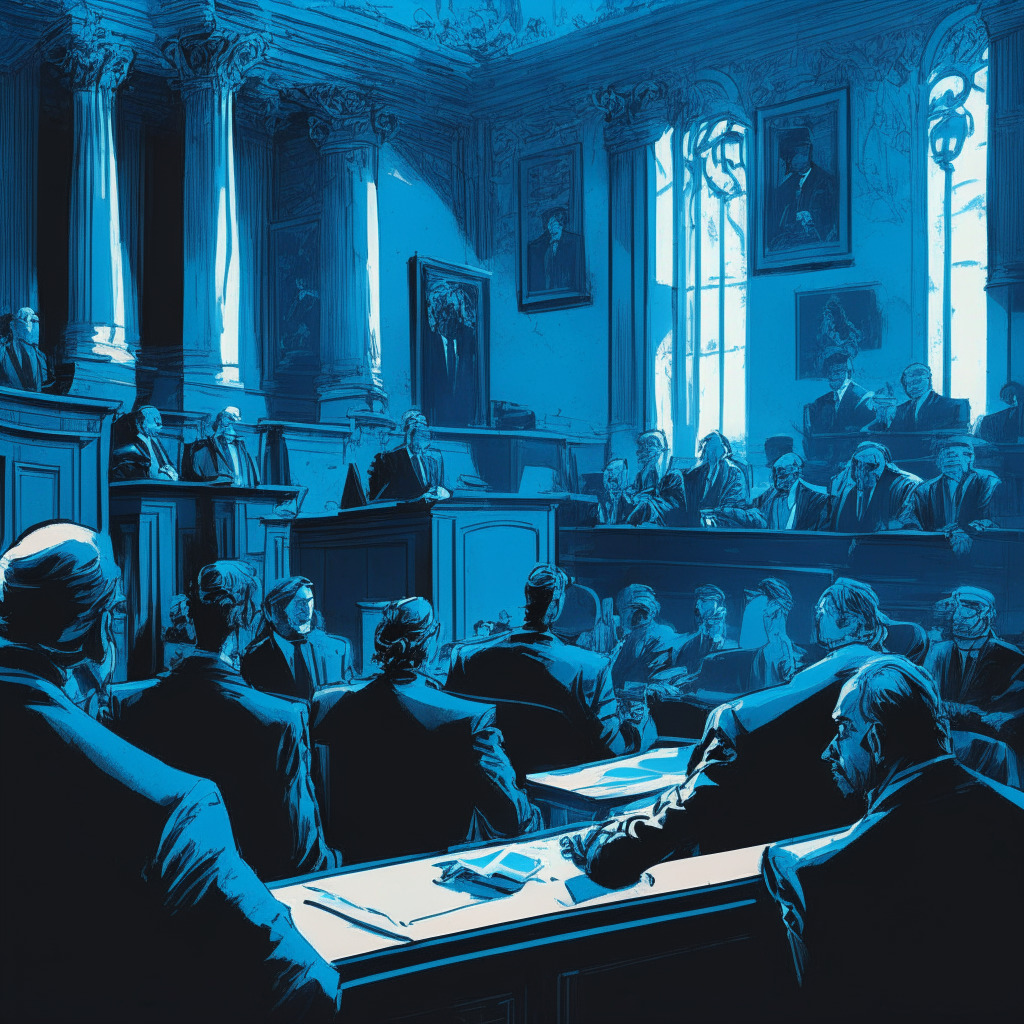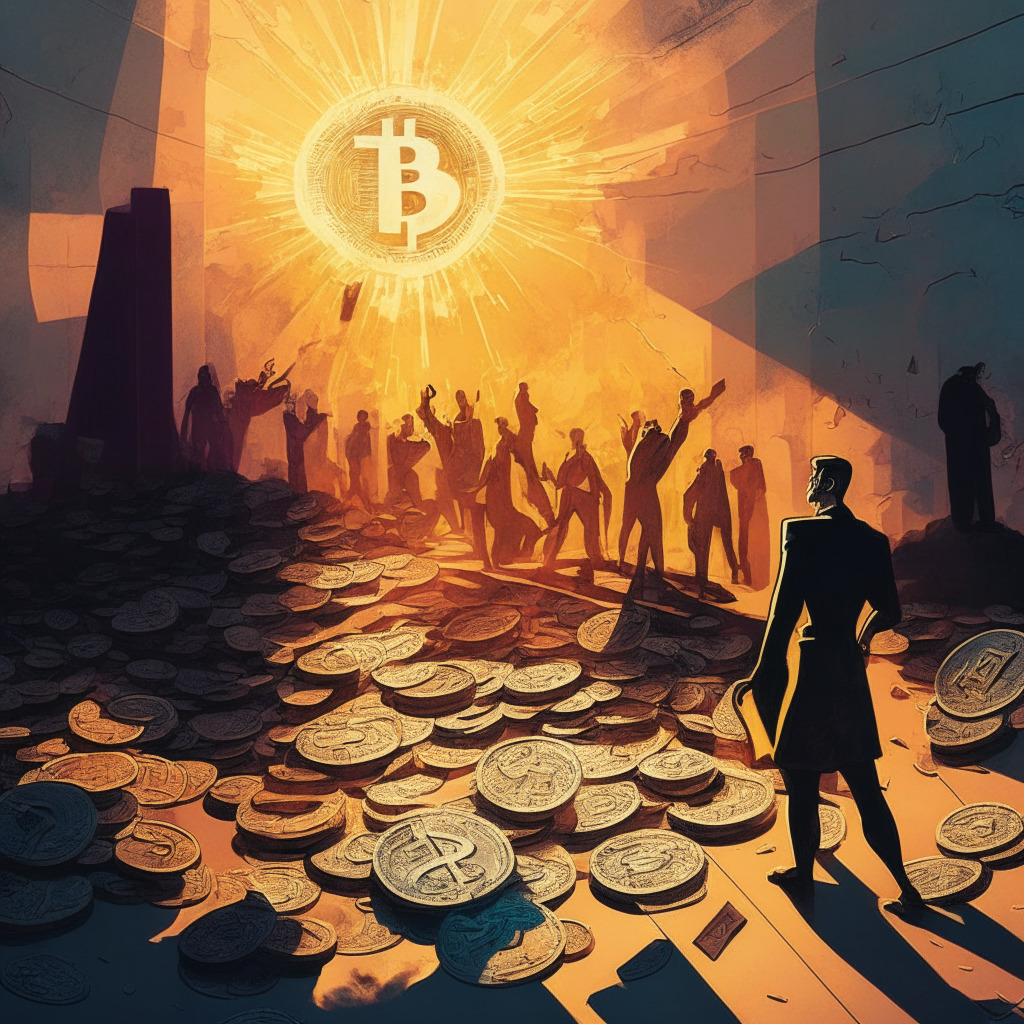Bitcoin experiences a downturn below $27,000 as investors assess U.S. debt ceiling deal and employment report impacts. JPMorgan research anticipates strong retail demand up to the next halving event in 2024, while Binance’s new appointment, Richard Teng, focuses on navigating regulatory challenges and bolstering the exchange’s legitimacy.
Search Results for: U.S
Binance Lawsuits and Crypto Regulations: Striking a Balance for Market Future
The crypto market faces regulatory challenges, with Binance facing lawsuits from the CFTC and SEC. The classification of top cryptocurrencies as securities adds confusion, emphasizing the need for comprehensive regulatory guidelines to balance innovation and investor protection.
SEC Lawsuit Against Binance: Implications for Crypto Industry and Investor Sentiment
The SEC has filed a lawsuit against Binance, accusing it of failing to register as a securities exchange and operating illegally in the US. This case could have far-reaching implications for the broader cryptocurrency industry, affecting investor sentiment, company growth, and regulatory frameworks.
Binance.US Independence in Question: Unraveling the Crypto Exchange Giant’s Latest Controversy
A Reuters report claims that Binance executive Guangying Chen secretly operated five bank accounts belonging to the allegedly independent affiliate Binance.US. This revelation could prompt further scrutiny of the crypto exchange giant’s relationship with its US arm, amid ongoing investigations into alleged money laundering and tax offenses.
UK Considers Appointing a Crypto Tsar: Will It Strengthen Regulation and Innovation?
The Crypto and Digital Assets All Parliamentary Group (APPG) has published 53 recommendations for the UK government, including the appointment of a ‘Crypto Tsar’ to ensure a coordinated regulatory approach for the crypto and digital assets space. The report emphasizes the need for protecting consumers, promoting economic growth, and fostering innovation as the sector continues to grow rapidly.
Richard Teng’s Role in Binance’s Future: Bridging the Gap with Regulators and Expanding Globally
Richard Teng’s appointment as overseer of Binance’s regional markets outside the U.S. signals a potential management shift, with founder Changpeng Zhou aiming to reduce his Binance.US ownership to appease regulators. Teng’s extensive regulatory experience will aid Binance in addressing enforcement actions and improving compliance. The company is also showing interest in crypto-friendly regions like Hong Kong, Dubai, and Europe.
BTC at $27,000: Breakout Imminent or Stuck in Familiar Territory? Pros, Cons & Conflicts
BTC hovers around $27,000 with an imminent breakout predicted. Despite the calm trading range, chances of reaching $30,000 increase as the 200-week moving average stays intact. With varying investor sentiments, large Bitcoin whales accumulating positions may fuel market surprise and volatility resurgence.
XRP’s Strong Decoupling and Potential Ripple IPO: Analyzing Pros and Cons
XRP, the world’s sixth-largest cryptocurrency, recently showed a strong decoupling from the crypto market due to whale activity and investor interest. Speculations of a possible Ripple IPO are on the rise amid expectations of an XRP price rally beyond $0.60. However, prospective investors should remain cautious and conduct thorough research, as the cryptocurrency market is prone to sudden fluctuations.
XRP Lawsuit Updates: Estimated Victory Odds, Decision Timeline, and Post-Ruling Predictions
Pro-XRP lawyer John Deaton predicts a 25% chance of an outright win for Ripple in the SEC lawsuit, a 50% chance of a “splitting the baby” ruling, and under 3% chance of SEC’s outright victory. Deaton expects a final decision before September 30 and speculates Ripple could IPO following the lawsuit conclusion.
Crypto Market Resilience Amid US Debt Dilemma and Regulatory Challenges
Crypto market displays resilience amid regulatory challenges and US debt concerns, with experts predicting pre-FOMC market correction. Experts expect correction and consolidation between $25K-$27K levels, while the decline in bitcoin options put/call ratio indicates reduced investor concerns. Ethereum’s post-merge performance captures market attention through increased staking demand and realized deflationary promise.
Neutral Technologies: Debunking Crypto Crime Myths and Promoting Balanced Discussions
Crypto, like cash, has no intent and is neutral in its use. Misleading claims suggesting that banning crypto would end illegal activities are unfounded. Balanced discussions and regulation, instead of prohibition, can better address criminal activities facilitated by any mode of value exchange.
Crypto Lawyer’s Phone Hack: Lessons in Cybersecurity and Trust for the Blockchain Community
Pro-XRP lawyer John Deaton’s phone was hacked, resulting in unauthorized promotion of the LAW token on Twitter. This incident highlights the risks of false information dissemination in the crypto market and the importance of cybersecurity and collaboration to protect investors.
Hacking of Crypto Influencer’s Account: Lessons on Security, Misinformation, and Market Integrity
Attorney John Deaton’s Twitter account was hacked, promoting an obscure cryptocurrency called $LAW token. This incident highlights the potential danger of misinformation and emphasizes the importance of skepticism, fact-checking, and vigilance within the crypto community to safeguard its reputation and integrity.
Elon Musk’s Dogecoin Lawsuit, AI Chat with Satoshi, and Crypto’s Regulatory Landscape
The article discusses a lawsuit against Elon Musk for alleged insider trading of Dogecoin, the development of a Satoshi Nakamoto AI chatbot, Binance CEO’s thoughts on acquiring a bank, and Crypto.com’s payment institution license in Singapore.
Proposed Crypto Bill: Balancing SEC Power and Fair Regulation in Digital Asset Industry
A drafted crypto bill proposed by Republican lawmakers aims to establish a clear framework for digital assets and hold regulatory bodies like the SEC and CFTC accountable for their actions, potentially changing the way digital assets are regulated. The bill could encourage fair enforcement practices, ensure consumer safety, and support innovation within the cryptocurrency markets.
Elizabeth Warren’s Crypto Crackdown: Protecting vs Stifling the Industry
US Senator Elizabeth Warren plans to introduce a bill closing cryptocurrency loopholes, asserting crypto payments fuel the Chinese fentanyl trade. The controversial stance sparks mixed reactions and divides political leaders, while raising questions on the future of the cryptocurrency industry amid regulatory scrutiny.
Ripple vs SEC: A Turning Point or Just Another Crypto Battle? Pros, Cons & Main Conflict
The Ripple Vs SEC lawsuit’s outcome may not set a legal precedent for crypto regulation in the U.S., as the SEC could interpret Ripple’s victory as a one-off case. This highlights complexities in regulating cryptocurrencies and emphasizes the need for comprehensive legislation in the rapidly evolving market.
US Crypto Mining Tax Proposal: Impacts, Reactions, and the Future of Regulation
The proposed Digital Assets Mining Energy (DAME) tax, which aimed to impose a 10-30% tax on electricity used for crypto mining, failed to make its way into a U.S. debt ceiling bill. The tax’s potential impact on global emissions, renewable energy incentives, and the uncertain regulatory environment stirred debates within the crypto community, highlighting the need for governments to embrace and properly regulate the evolving blockchain future.
HSBC Recognizes Ripple’s XRP Ledger: Game Changer or Regulatory Minefield?
HSBC, one of the world’s largest banks, highlights Ripple’s XRP Ledger as a game changer in the financial sector for real-time cross-border settlements. Despite ongoing legal challenges with the U.S. Securities and Exchange Commission, Ripple’s global expansion and strong YTD increase suggest potential success but warrant caution in navigating regulatory issues and broader concerns.
Debt Ceiling Deal Impact: Crypto Stability Amid Recession Fears
Positive market sentiments in global stock and crypto markets follow the Biden-McCarthy Debt Ceiling Deal and U.S. Federal Reserve’s potential interest rate decision. However, risks remain for volatile assets like cryptocurrencies due to uncertain macroeconomic conditions, regulatory challenges, and weak technical charts. Conduct thorough research before investing in cryptocurrencies.
Bankrupt Crypto Lender’s $800M ETH Staking Move: Impact on Ethereum Validator Queue & Market Safety
Crypto lender Celsius Network’s $800 million Ether staking move has caused significant delays in the Ethereum validator queue, stretching it to 44 days. Following Ethereum’s Shanghai upgrade, Celsius reshuffled staked ETH holdings, potentially adding nearly a week of delay. This highlights the need for a more scalable and accessible network as Ethereum 2.0 transitions to proof-of-stake.
Crypto Signup Bonuses: A Comprehensive Guide & Platform Comparisons
Crypto signup bonuses are incentives for joining cryptocurrency exchanges, such as eToro, StormGain, and Coinbase. It’s essential to compare supported currencies, NFTs, trading, and account fees alongside bonuses to select the exchange that best fulfills long-term needs and interests.
Ripple Effects of FTX Collapse: Analyzing Industry and Regulatory Impacts
FTX’s collapse led to a ripple effect on crypto companies like Silvergate Bank, BlockFi, and Genesis Global Capital, debanked crypto firms, and a regulatory crackdown. Binance considers boosting compliance, while Tether plans sustainable BTC mining in Uruguay. Nvidia, Microsoft, and other tech companies advance AI technology and NFT marketplace, Tabi raises $10 million for gaming ecosystem development.
Bitcoin’s Stability Amid Economic Turmoil: Cryptos Defy Market Fluctuations & Regulation Woes
Amidst a rollercoaster week filled with debt limit deals and complicated job reports, Bitcoin remains stable, trading at about $27,180, up 1.2%. Edward Moya attributes this stability to discussions surrounding the Securities Clarity Act, which may offer classification guidelines for tokens. Despite ongoing market fluctuations and regulatory uncertainty, Bitcoin’s resilience remains noteworthy.
Pathway to Digital Commodities: Balancing Innovation and Regulatory Compliance in Crypto
The draft bill by the United States House Financial Services Committee and House Agriculture Committee proposes a pathway for certain crypto assets to be labeled as digital commodities, offering regulatory clarity for crypto firms. However, it also raises concerns over digital assets’ classification and potential limitations due to increased regulatory measures.
Draft Bill May Reshape Crypto Regulation: Pros, Cons, and Main Conflict
Senior House Republicans introduced a draft bill aiming to establish a concise framework for digital assets in the U.S., allowing regulated crypto firms to argue for commodity classification. The legislation would also introduce digital commodity exchanges with oversight by the Commodity Futures Trading Commission. However, it currently lacks support from Democrats and faces challenges in achieving consensus.
Demand for XRP Relisting on US Exchanges: Legal Precedent and Community Outcry
This article discusses the demand to relist XRP on US-based crypto exchanges and the legal precedent concerning its delisting. Uphold, a US crypto exchange still offering XRP trading, states no legal precedent exists for not listing the token.
SEC-Registered Crypto Exchanges: Boon or Bane for Digital Assets Future?
A proposed bill could allow crypto exchanges to register with the U.S. SEC, enabling trading of digital securities, commodities, and stablecoins in one place. However, it faces caveats such as lack of Democratic support and ongoing SEC authority over asset jurisdiction.
Stablecoins: A Solution to Crypto’s Banking Crisis Amid Operation Chokepoint 2.0
Stablecoins may counter the impact of Operation Chokepoint on the crypto sector, providing a solution to the US banking crisis facing crypto companies. Leveraging stablecoins can minimize bank dependency and establish an autonomous parallel financial system, despite potential risks and regulatory challenges.
Declining Market Share of Binance: Implications for Crypto Exchanges and Future Strategies
Binance’s market share has dropped to its lowest level in eight months, raising questions about the future of crypto exchanges. Factors like regulatory scrutiny, staff layoffs, and centralized exchange vulnerabilities contribute to the decline, emphasizing the importance of regulatory compliance and decentralization in the evolving crypto landscape.
Cardano’s Surge and Milestones: Can ADA Outshine Ethereum in DeFi?
Cardano’s ADA price surges 4% with 2 million transactions processed in the past 28 days, and 1,245 projects built on its blockchain. The Marlowe smart contract platform, focus on decentralization, scalability, and liquid staking offering contribute to its growth and potential, despite lagging behind Ethereum in DeFi activities.
Ripple Vs SEC Lawsuit: Summary Judgement Predictions and Implications for Crypto Future
The Ripple Vs SEC lawsuit continues to captivate the crypto community, with lawyer John Deaton predicting a Summary Judgement by the end of September 2023. The case holds significant regulatory implications and potential impact on the future of cryptocurrencies in the United States.































